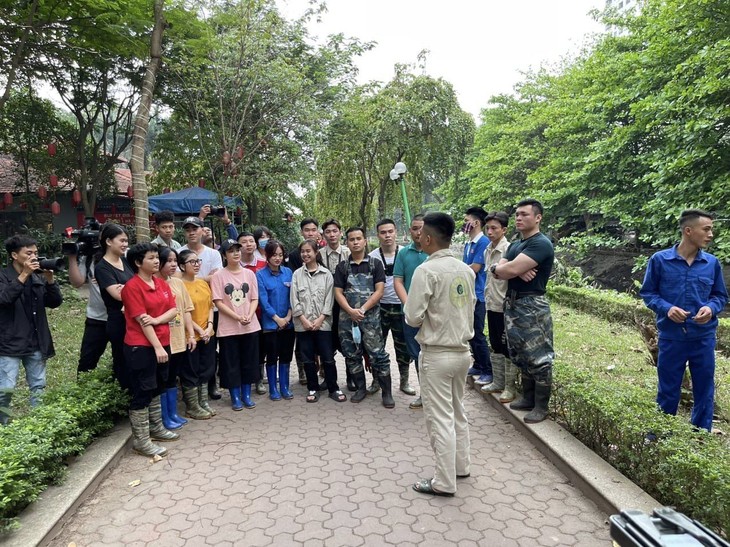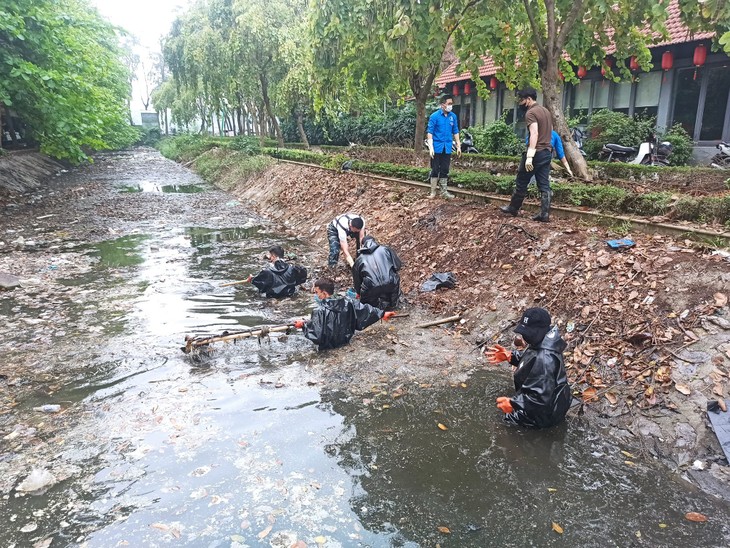"At first, I was afraid. Just imagine standing beside the river and smelling its foul odor, who wouldn’t feel scared?” Huy recalled.
“But my love for the environment overcame my fear. My colleagues and I have conducted 40 cleaning sessions, aiming not only for a ‘green Hanoi’, but helping all 63 cities and provinces to become green," he said.
In his role as the leader, Huy is responsible for ensuring that the cleaning sessions run smoothly, and that the safety of project members is protected.
Prior to each cleaning session, Huy conducts some research and analyzes the location’s specific water and pollution level. This enables him to determine the most effective cleaning methods.
"I create a comprehensive plan that assigns clear roles to each team member and provide them with appropriate equipment and protective clothing. We ask team members who wade into rivers, the most dangerous work, to get a tetanus vaccination and undergo training beforehand on the hidden dangers of the riverbed. Once the cleaning session is complete, we transport all the garbage collected to the local trash disposal point," Huy said.
 Huy and other volunteers discuss before a cleaning session. (Photo: Green Hanoi) Huy and other volunteers discuss before a cleaning session. (Photo: Green Hanoi) |
During each session, Huy and his colleagues take photos and record their activities, which they later upload to social media. They were astonished that their content received a substantial amount of recognition from the public.
"We have leveraged the power of social media platforms like Facebook and TikTok to promote our project. Our focus is on the younger generation who hold the key to becoming future environmental guardians for Hanoi. Thanks to the overwhelming response and applause we have received on social media, many enthusiastic young individuals have come forward to join our project."
The youngest volunteer in Huy’s project, Nguyen Mai Linh, is a student at Hanoi University of Industry.
"At first, I was afraid, since I had never attempted to do something like this before. But after the first cleaning session with Huy and other volunteers, I realized that I needed to overcome my fear to achieve the desired outcome,” said Linh.
Undertaking a bold task that not everyone dared to do, Huy and his colleagues embarked on their mission and faced numerous risks and hazards that bystanders simply could not comprehend.
Huy said smell is not the biggest challenge they face while wading into the rivers. The hidden dangers in the riverbed, such as used needles and pieces of crockery, pose a greater threat.
"If one is not careful and gets hurt by these objects, it could cause a severe infection and disrupt the entire session. That’s why I always take charge of all sessions and remind the volunteers to be cautious when treading into the rivers and keep an eye out for any potential hazards to keep unfortunate incidents from happening."
 A cleaning session conducted by Huy and his colleagues. (Photo: Green Hanoi) A cleaning session conducted by Huy and his colleagues. (Photo: Green Hanoi) |
Huy’s unwavering determination to safeguard the environment has resulted significant improvements, providing a great source of inspiration to continue on their journey.
After completing each cleaning session, Huy revisits it to assess the results.
"For instance, we conducted five cleaning sessions in the To Lich River, one of the most severely polluted rivers in Hanoi. When I returned there to evaluate the situation, I was pleased to see positive signs from the public, as there was a significant reduction in floating garbage and overall trash volume. Our project has served as an inspiration to other localities, resulting in similar initiatives, such as ‘Green Binh Duong,’ ‘Green Nghe An,’ and ‘Green Gia Lai.’”
This project was not established solely for the purpose of picking up trash in the rivers and canals, Huy says, adding that he can’t keep up with this work forever, since the problem of pollution persists.
"We hope we will receive support from the local authorities for our cleaning activity and persuade the community to protect the environment more effectively. We know we can’t succeed alone, and our work will be futile without other people’s cooperation.”